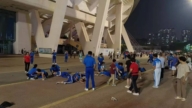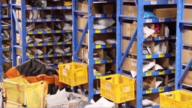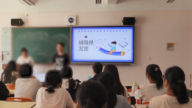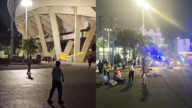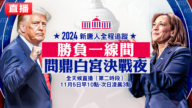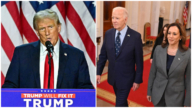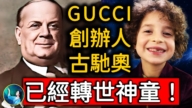【新唐人2012年11月3日訊】「北京大學公眾參與研究與支持中心」發佈的一份報告指稱,在中心的調研人員向42個國務院下設機構,申請「2011年人均辦公經費」時,被 34家拒絕,他們甚至聲稱申請項目「屬於國家秘密」。專家表示,中共官場內部已是體制腐敗,因此無法向世人交代、行政無法公開。
11月1號,「北京大學–公眾參與研究與支持中心」舉行了《中國行政透明度觀察報告•2011-2012年度》發佈會,其中《「三公」經費公開調研專題報告》引人注目。
根據《法制日報》報導,從2012年3月開始,調研人員以公民個人身份向42家部委機關申請公開「人均辦公經費」信息,遇很大阻力,僅有9家公開自己信息,其餘33家以種種不充分理由予以拒絕。
調查《報告》結果顯示,拒絕提供「人均辦公經費」信息的33家部委理由也不相同,有的聲稱 「部門決算正在審核批復」;有的則乾脆置之不理﹔也有的認為「人均辦公經費」不屬於政府信息公開的範圍,央行甚至說「人均辦公經費」屬於國家秘密。
大陸維權律師李向陽:「通過一些學者以及一些人士的分析,我們了解到,中國GDP的60%都被政府消費了。比如說,中國的公開消費,光這一項一年就是9000多個億。每年每個單位辦公經費裡邊,會有相當一部分流入領導的腰包之中去了。他們的經濟是無法公開的。」
大陸維權律師李向陽還表示,中共政府和機構的行政都是暗箱操作,一旦公開,他們的潛規則就會被暴露,他們用於自己貪腐,甚至包二奶的經費,會無法向世人交代。
「中國政法大學–法治政府研究院」副院長王敬波教授分析指出,根據《中華人民共和國政府信息公開條例》的相關規定,「人均辦公經費」屬於財政預算決算的範圍內,當然就屬於政府信息應重點公開的範圍,以任何理由拒絕提供信息和置之不理,違背條例規定。
王敬波認為,央行以「人均辦公經費屬於國家秘密」也不符合《保守國家秘密法》的規定。
大陸《光明網》指出,政府的行政經費的每一分錢,都來自納稅人所繳納的稅款,從邏輯上講,納稅人與政府官員是僱傭與被僱傭的關係。出錢僱人辦事的「主人」,問問被僱辦事的「僕人」辦了多少事、花了多少錢,不是再正當不過的一件事嗎?
《中國事務》總編伍凡:「他們把國家利益當作自己的私人利益,完了用國家的秘密擋住你,不准你檢查,甚至審計署你都查不到,甚至他們有多少小金庫也不讓知道。寧可他自己撐死了也不讓餓的人吃飯,這就是整個體系腐敗。一個人進去(體系)……你不想貪污……你做不到。」
伍凡指出,沒有制約的中共官員無法無天,沒有任何民間和媒體的監督,形成了中共官場的體制性腐敗,所以他們不敢公開信息。
在貪腐遠沒有大陸盛行的民主社會——台灣,司法獨立的最高法院認定前總統陳水扁貪污,就把他判刑十一年﹔近來馬英九總統的愛將、官拜行政院秘書長的林益世,就被檢察官求處重刑。
《光明網》認為,行政不透明,政治不透明,是腐敗的根源,是「表叔」、「表哥」、「房叔」和這「姐」、那「姐」層出不窮的重要原因。行政透明、政治透明,是權力規範運作的前提性限制條件。
採訪/李蓮 編輯/宋風 後製/周天
Are Chinese Communist Party (CCP) Office Expenses
State Secrets?
Public Participation Research and Support Center in Peking
University released a report.
It alleged that the center researchers had applied for 42 per
capita office expenses in 2011 to units of the State Council.
34 applications were rejected, claiming the applications are
state secrets.
The experts said within the CCP officialdom, it is institutional
corruption which cannot confess to the world.
It is unable to disclose administrative expenses.
On Nov. 1st public participation research and
support center in Peking University
held a press release on ‘administrative transparency
observation report from 2011-2012′.
The special report on three public funds research
was compelling.
According to Legal Daily report, since March 2012,
researchers applied to publicize per capita office expenses
in 42 agencies and regions as individual citizens,
meeting great resistance. Only nine gave details
with 33 units refusing with various reasons.
The results of the survey showed the 33 ministries refused to
provide per capita office expenses for different reasons.
Some said the budget was under final approval,
some ignored it,
some believed per capita office expenses did not belong to
the public realm, the central bank even said it is state secrets.
Li Xiangyang, a human rights lawyer in China said,
“With some scholars’ analysis,
we learned that 60% of China’s GDP
is used by the government.
E.g. public consumption in China is more than
RMB 900 billion per year.
A considerable part of office expenses went into the pockets of
leaders every year. So could not be disclosed in public."
Li Xiangyang, a human rights lawyer in China also said that
the CCP is under black-box operation.
Once their expenses were publicized,
their unspoken rules will be exposed too.
Money they used for corruption, even for mistresses,
could not be shown to the world.
Professor Wang Jingbo, vice dean, Legal government research
center, China University of Political Science and Law said that
Government Information Transparency Regulations of the
People’s Republic of China, should have transparency.
Per capita office expenses belong to financial budget
and should be disclosed;
if anyone refused to provide the information or
ignored requests, it is against the regulations.
Wang Jingbo believes the central bank’s view that “office
expenses per capita are state secrets",
also means it is not conforming to the provisions
of the State Secrets Law either.
Guangming website in China pointed out that
every penny of the government administrative funding comes from the taxes paid by the taxpayers,
so logically taxpayers to government officials are
in a relationship of employer to employee.
So if the Master providing money asked the servant
how much money was spent on what things, isn’t it legitimate?
Wu Fan, editor of the affairs in China said, “They take
the national interests as their own private interests.
Then block you with threat of national secrets,
not allowing you to investigate.
Even the Audit Department cannot do investigations, and
nobody knows how many private treasuries there are.
They do not let the hungry eat even when they themselves
had too much food with more to spare.
This is a systematic corruption. If one enters their system,
it is impossible not to be corrupted too.”
Wu Fan pointed out that CCP officials had no constraints
and are lawlessness in behavior.
There is no supervision of any non-governmental organizations
or media, which formed institutional corruption of the CCP.
They did not dare to disclose the necessary information.
In a democratic society of Taiwan with much less corruption,
the Supreme Court with judiciary independence found former
President Chen Shui-bian guilty of corruption, and sentenced him to eleven years in prison.
Recently, President Ma Ying-jeou’s general, Executive Yuan
Secretary, General Lin Yishi was sentenced by the prosecutor.
Guangming website believes administrative and political
Opaqueness and personal relations in politics is corruption.
Administrative and political transparency is the premise of
a regulated power operation.


